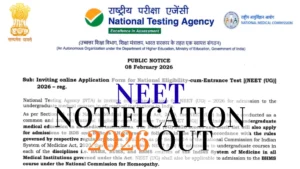The National Eligibility Entrance Test (NEET) UG is fiercely competitive with more than 20 lakh students taking the exam every year for around 1 lakh MBBS seats. Due to such an intense competition, the harsh reality is that many students cannot complete their dream of becoming a doctor. Many such students take drop year for taking the exam next year. Now the question arises, How Many Drops Should One Take for Clearing NEET UG Exam? Is there any specific time period after which students should move on or should they keep trying for more years. We will try to find the answer of these tough questions in this article.
How Many Drops Should One Take for Clearing NEET?
The NEET exam serves as the sole medical entrance examination in India. Admission to MBBS, BDS, BPT, Nursing, and various other medical programs can be obtained via NEET UG. Since it’s the sole method for gaining entry into these programs, the rivalry for NEET is extremely competitive. Many individuals are unable to complete it in one attempt, so they opt to take a break.
This signifies that they do not enroll in colleges that year and instead study for the exam again. Following extensive preparation, they retake the exam with the hope of passing it. But what happens if they can’t pass it in the drop year? Is it worthwhile to take another drop? What if they try 3 drops, 4 drops, or even 5 drops? How many gap years are sufficient for NEET?
How Many Drops Should One Take for Clearing NEET UG Exam?
There is no simple answer to the question: How Many Drops Should One Take for Clearing NEET UG exam? Many students clear in their first drop year while many takes more than 1 drop year to achieve their MBBS dream while the lucky ones clear it without taking any drop.
Honestly, there is no information on how many droppers successfully pass NEET. From news sources, result analysis and personal experience, roughly 60% of my students in medical school are droppers. Among them, approximately 40% of the students are second or third-time droppers. This indicates that droppers possess a higher success rate compared to freshers.
How Many Drops Should One Take for Clearing NEET UG- Factual Analysis
Of 25 lakh candidates, only 0.5% pass. Among this top 0.5%, some are droppers while others are not. You cannot definitively claim that you will pass NEET as a beginner, nor can you assure that taking a gap year will be the answer. For certain students, taking a gap year is the solution. Certain individuals manage to succeed in NEET after three attempts. However, for certain candidates, even 5 drops are ineffective.
I cannot provide you with a certain answer, nor can you claim that ‘x’ number of drops will suffice. The response to the question: “How Many Drops Should One Take for Clearing NEET UG Exam” is quite subjective.
If you are wondering where to set the limit, I would personally set it at 3 attempts. However, I am unaware of your problems; I am not in your situation. Some have a fairly cozy environment and mindset for preparation. Some may not enjoy the same privilege. Therefore, rather than having another person draw the line for you, take the initiative to do it on your own. Permit yourself only as many attempts as you can manage. You must take many factors into account when making this decision. Reflect on your family’s support as well, and only then decide to take a drop.
How Many Drops Should One Take to Clear NEET
Although one or two drops are quite typical and acceptable for NEET UG, every extra drop must be considered thoughtfully. Success isn’t assured, but your preparation approach, mental attitude, and self-awareness can greatly affect the result. The limited data available from successful candidates point to the following conclusion:
| Drop Count | Acceptance Level | Key Insights |
| One Drop (Ideal) | Most common and widely accepted | – Full year to reinforce Class 11 & 12 concepts
– You already have a base, so the second attempt can be powerful with the right strategy |
| Two Drops (Challenging) | Acceptable if there’s genuine progress | – Needs deep introspection on past mistakes
– Could be due to poor time management, weak concepts, or mental health issues |
| Three or More Drops | High risk, not generally recommended | – Risk of academic/emotional burnout – Career gaps may affect future plans
– Consider alternatives like BSc, Pharmacy, or Allied Health Sciences |










 NTA NEET 2026 Notification OUT at neet.n...
NTA NEET 2026 Notification OUT at neet.n...
 NEET Preparation Strategy 2026: Detailed...
NEET Preparation Strategy 2026: Detailed...
 Free NEET Sample Papers 2026 PDF | Downl...
Free NEET Sample Papers 2026 PDF | Downl...








